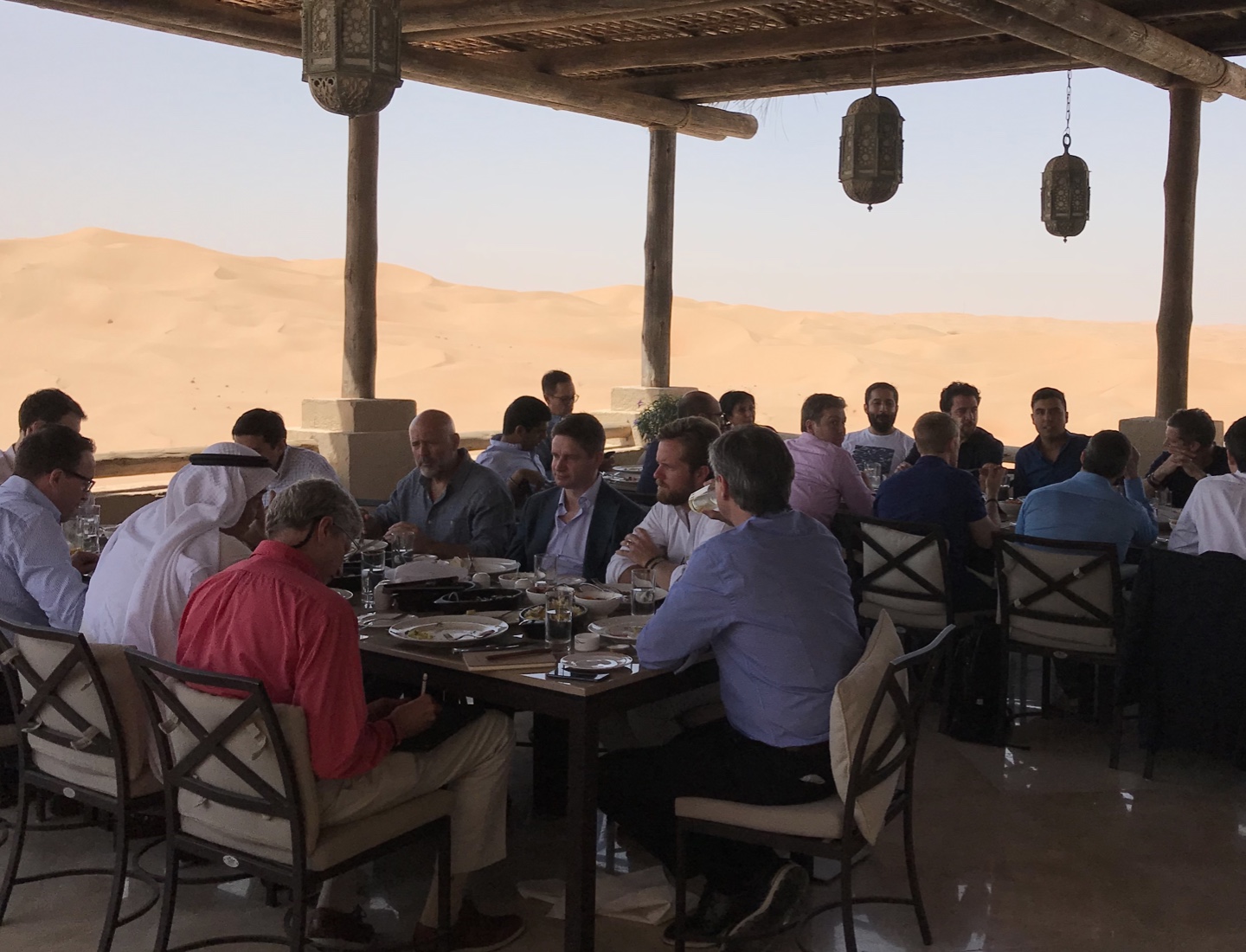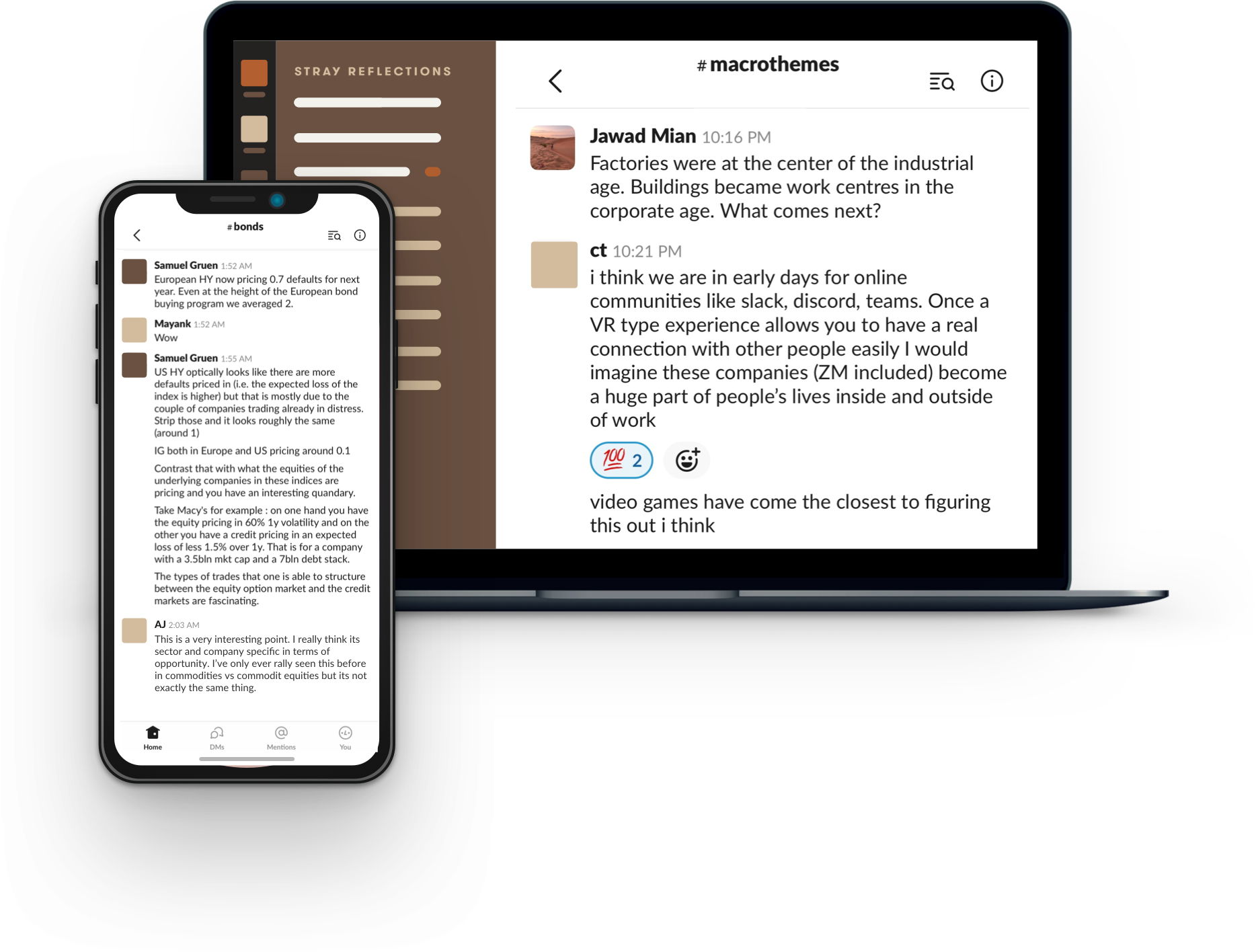The Prophet said: “In every craft seek the expertise of its experts.”
In the thoughtful environs of the Stray Reflections community, Steven Cohen, CEO of Point 72 Asset Management, joined us to offer an exclusive glimpse at how he approaches his craft.
Here’s a pared-down version of our salon. You can watch the full interview here.
On trading becoming easier
“The game has become more and more competitive over time. The brain power in the industry is probably as strong as it’s ever been. As someone who’s been around for a long time, I’ve got to work harder to keep up. I’m not sure it ever becomes easier.”
But Steve’s got wisdom. The sum of his experience makes trading mentally easier.
After all, time in the markets should provide perspective. “If you don't have perspective after doing this for 45 years, when are you gonna get it? I’ve got perspective.”
This perspective sees him handle volatility better than most people. When conversation turned to trading during the worst part of the pandemic, Steve lit up with excitement. Those periods of high volatility? He loves them.
“When things get serious, that’s when you take your game up a notch. I get very thoughtful, more involved. I really enjoy it. My focus goes up. I get calm in my decision-making; I don’t panic.
“When I’m losing money, I’m okay. It doesn’t throw me. That’s part of the gig. I lean into it, embrace it, and enjoy it. It gets my juices going. It’s about making decisions that make sense.”
On his morning routine
Steve is like a professional athlete. He has structured his life in a way that allows him to operate at peak performance.
His preparation for the day starts the night before by reviewing reports his portfolio managers send him. His portfolio is structured so that he can prioritize sleep and does not have to check the markets in the middle of the night.
“I get up around 7 and hang with my wife. I don’t rush out. We’ll just start the day watching the news. I’ll check markets on my phone and hit the desk around 7:30.
“I’m in touch with my portfolio managers getting updates on all their sectors. I’m up to speed on what they’re doing, how they’re thinking. We do a risk meeting at eight o’clock every morning.”
Steve wears two hats at his firm, operating both as a portfolio manager and CEO. The mornings are dedicated to trading. He’s running less capital than he used to, so he’s not the focal point anymore. There are 150 portfolio managers across the various strategies.
“It is liberating that the firm is much bigger than me. I built it that way, you know, that’s a real business. It allows me to do what I want and focus on other things.”
Steve notes he has a desire to learn from other people and their experiences. His curiosity leads him to explore, which comes back to shape how he thinks about his fund.
On why he never takes a break from markets
“Your portfolio doesn’t know that you want to take time away—it’s going to move regardless—so you can’t pretend like it doesn’t exist.
“I use my weekends to meet people and expand my horizons, spend time with my family and try to live more of a full life. But it is hard to take time away from markets.”
He also does calls with his management team and speaks with his PMs on Sunday night to talk ideas.
On being restless
Steve is a great example of somebody with a growth mindset. He recognized that to keep playing at an elite level he had to change with the times. Markets evolve.
“We developed our own style that worked for us pretty well in the nineties. But I also realized that our style was not scalable. To continue to succeed we had to morph into something different. I drove my team crazy because I wanted to tear things down and reinvent while we were doing well.”
Steve never stops improving because he knows that both he and his firm can accomplish bigger things.
“I am just restless; I am never satisfied with where I am. It’s not because I am not happy. I just see things and say we can do that and see no reason to stop where we are. It’s not about making more money; it’s about knowing we can accomplish that.”
On the cardinal rules for risk management
“If you’re in illiquid stuff, that’s a problem. Using too much leverage, that’s a problem. And if you’re too concentrated, that’s a problem.” He allows that one or maybe more of these pillars can be shaky and you’ll still be fine, but in the absence of all three, “you’re whistling past the graveyard.”
Steve examines his losing trades rather than his winning trades and is always focused on where the portfolio is not working.
“I don’t look at my winners, I look at my losers. Why am I losing money? I try to figure out why something is not working. Am I missing something? Has something changed? That is where I focus. If I don’t know, then I reduce. We’re only right 52 percent of the time. I use my judgment and listen to what the markets are telling me. I can always come back to a trade at another time.”
On the importance of knowing oneself
“Your unconscious is talking to you. Something in you is triggering thoughts. It is more than gut feel. It’s your eyes, your brain, intuition, experiences you’re picking up. It’s more than a balance sheet or income statement or some recommendation.
“When you’re sitting in front of screens all day, your brain is working. What is the conversation going on in your brain? You have to listen to it. Is it fear I’m going to lose money? Are you ignoring your real thoughts? Are you waiting for someone to tell you what to do instead of acknowledging your own thoughts and beliefs?
“You must get a handle on the internal conversation. I’m really aware of it. I am aware of the mistakes I might make. It gets down to knowing yourself, listening to these conversations in your head, and what you are going to do about it. I deal with this all day long.
“I’m not sure everyone’s aware.”
On the most common mistakes traders make
“It is a battle to see the world for what it really is and not how we want it to be. We lose this battle constantly and sabotage ourselves because we are afraid of success. The key to maximum performance is for us to be honest with ourselves, to embrace reality, and to hold ourselves accountable for our actions.
“People sabotage themselves. They are afraid of success. They are not honest with themselves. Because of that they don’t look at the world as it really is but look at it how they want it to be. It gets reflected in how they run their portfolios.
“The more truthful, reflective, and honest you can be with yourself the more likely you will fix your problems and work at a level of maximum performance. This is the internal war people must fight to get to what the truth is. That’s how you get to success. This is a conscious fight on a daily basis.
“It’s amazing how people blame the market and outside forces as opposed to being accountable and dealing with it.”
On handling a losing streak
“When you go into a slump you have to identify why. Has your process changed or has something changed you have not identified? This is why weekends are good. Your mind is freer to think about things.
“What’s happening? Is there something I can do about it? Do I need to change my focus? I start looking at other types of situations to become less narrow and perhaps get involved so my portfolio is more well-rounded.
“Try to analyze why it’s happening and be thoughtful instead of attributing it to not working hard enough. Capture those little shifts. I’m motivated by that.
“It would have to be a significant drawdown over months and months for me to really question Did I lose it?”
On the excitement of crypto
“I’m fully converted to crypto. You have to pay to learn; there’s no way around it. You can talk all you want, but you’ve got to get in the game.
“The timing is never good. Who knows if it’s going to go up? I don’t care about the bitcoin price. I care more about the blockchain technology and how disruptive it could be. The way those markets are developing could be a real interesting adjacency to what we do.
“I’m not going to miss this. I missed the first part, but I still feel like I’m early. I may look foolish initially, but it accordingly to learn the game. And then, when you’re confident, take it to the next level.”
On why trading doesn’t define him anymore
“I thought my skills were narrow but realized somewhere along the way they are not. My background and ability to look at situations and ask questions to figure out what’s going on is applicable in other areas. I can expand my horizons, and it’s more fun. I’m not defined as just a trader or a hedge fund guy. I’m blessed I have so many ways to express myself in the world.
“The older I get the more I want to be getting my head out of the screens. I think that’s the killer, having your head in the screens all day. You just miss the forest for the trees.”
On learning from the pandemic
“Without question, I don’t have to be in the office. How phenomenal is that?
“The reality is I have people all over the world, and they never see me. Some notion in my head that I had to be there daily is just not true. I can run my firm from anywhere. I don’t see myself in the office more than two or three days a week. Which is really liberating.
“I have enjoyed my time with my wife. We had the best time together during Covid. This is why I want to make sure I spend more time here and not the office. I can run the firm from here and I’m okay. You realize how much time gets taken from silly things.
“I am lacking in time. I need to do things I really want to do and not things people want me to do. I can get trapped by people in situations that are not the best use of my time.”
On what keeps him going
“I grew up in a family with eight kids, so I can relate to wanting time and acknowledgment from your parents. I loved to spend with my dad on the golf course. If I played badly I would be so miserable because I wanted him to see me as talented. That was so important to me.”
“I was the best athlete in the family. I was probably the smartest in the family. And it just didn’t mean anything. I didn't get the attention that I wanted. I used to sit with my parents at the dinner table, every night, just so I could be with them. I was the only kid that would do that.
“I have seven kids and it’s difficult to spend time with all of them. I can relate to wanting that time and acknowledgment. It’s probably driven me to search for acknowledgment. I’m hardwired that way now, and it’s turned into a desire to be the best I can be no matter what.”
On living with generosity
Amorphous ideas about “success” leave Steve flat. “Like, I don’t even know what that is, you know … it’s meaningless to me.” Success to him is about what he calls a “generosity of spirit.” He wants to connect with people and help them accomplish what they want to accomplish.
This personal framework for moving through the world, if you like, has Steve seeing members of the public and his employees not as cogs in the wheel but as opportunities for a two-way commitment. “How can I affect that person’s life? And how can I help them?
“It’s all about connecting and changing people’s lives. It’s about giving back in any way I can. That’s where I’m at now. Life feels more fulfilling. And, you know, I'm grateful for that. It’s a cool place to be. I love this age.”







